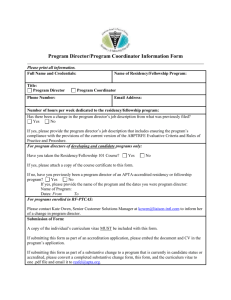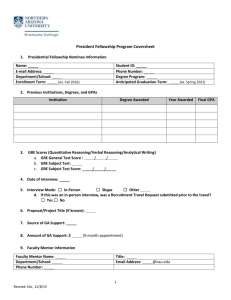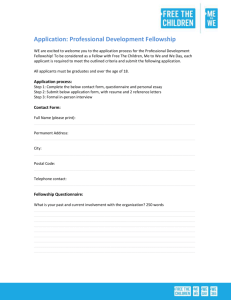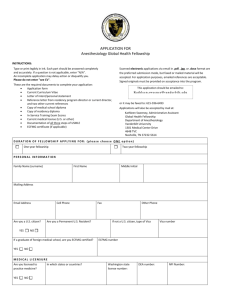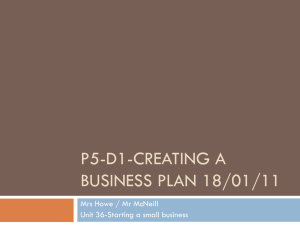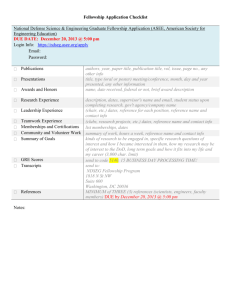Fellowship Interviews
advertisement
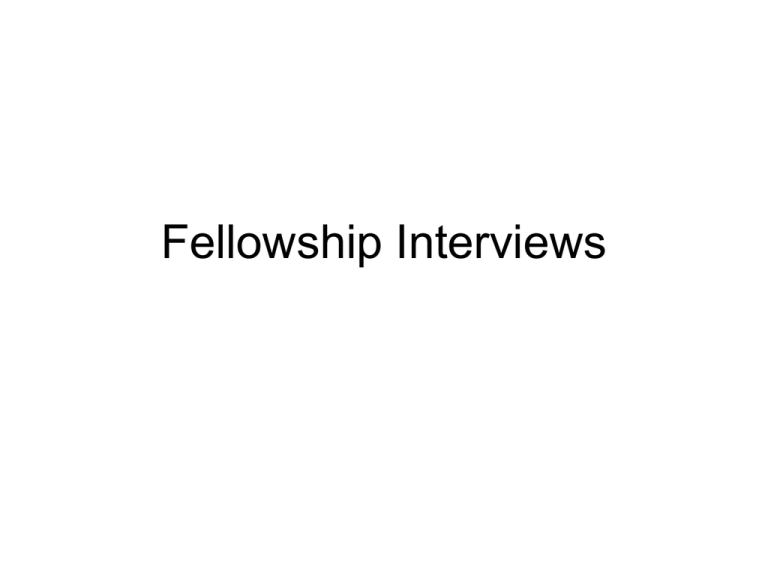
Fellowship Interviews The interview is important • First impressions are lasting • It’s the only chance they will have to meet you • Small problems can become magnified – Treat everyone well – including staff – The worst thing you can do is to stand out in a bad way – so try to fit in. Survey: Qualities important to (cardiology) fellowship PDs: 1. 2. 3. 4. 5. 6. 7. 8. 9. 10. 11. 12. 13. 14. 15. 16. Negative comments in letter written by IM PD Personal comments by the IM PD The personal aspect of the interview Letter from a cardiologist known by the fellowship PD Performance during an elective at the fellowship site Rank order in the residency class Genuine interest in research Being a graduate of a US medical school Letter from a nationally known cardiologist Doing a residency program at an institution with a well known cardiology division Participation in research prior to the fellowship program Assessment of medical knowledge during the interview Publications prior to fellowship Performance on the ABIM certifying examination if available US citizenship Performance on the USMLE Tips for the interview • You need to appear confident and professional – Be rested (as much as possible) – Dress professionally – better safe than sorry – Avoid overpowering colognes, perfumes • Carry a portfolio or briefcase – Bring extra copies of your CV and PS Prepare in advance • Know your stuff – Be prepared to answer questions about anything on your CV – Interviewers can tell if you have really done the research – or have gone along for the ride • Know the program you are interviewing at – Read everything you can on their website – Know whom in the program shares similar interests – Recognize faculty member expertise – interviewers Prepare in advance • Do be ready to ask questions – It shows that you are interested in the program; ask about specifics. No questions = not interested. – Stock questions: • • • • What changes do you anticipate? Where have graduates gone? How much research productivity is there? What is supervision like? Number of procedures? • Don’t ask certain “stupid” questions – Duty hours, etc – About services you should know they don’t have During the interview • • • • Shake hands Maintain eye contact Remember the interviewer’s name Ask for their card or contact information – Take notes on the back of card as reminder • Concentrate on being concise and coherent • Be sure you are expressing enthusiasm – it’s catching Prepare your answers to common questions 1. What are your career goals? 2. How can this program help you meet those goals/ what are you looking for? 3. What are your strengths and weaknesses? 4. Give an example of a great case you’ve recently been involved with. 5. What questions do you have for us? • Make sure you have some! Practice being interviewed • Ask a friend with whom you feel safe • Make a list of questions you think you might be asked (specific to your application) • Consider audiotaping your answers so you can hear how you sound Follow up • Thank you notes – If you write them, be very specific about what makes them and you a great match – Include at least one specific comment from each interview – Email only if invited to do so – Don’t go overboard Comments from experienced residents
